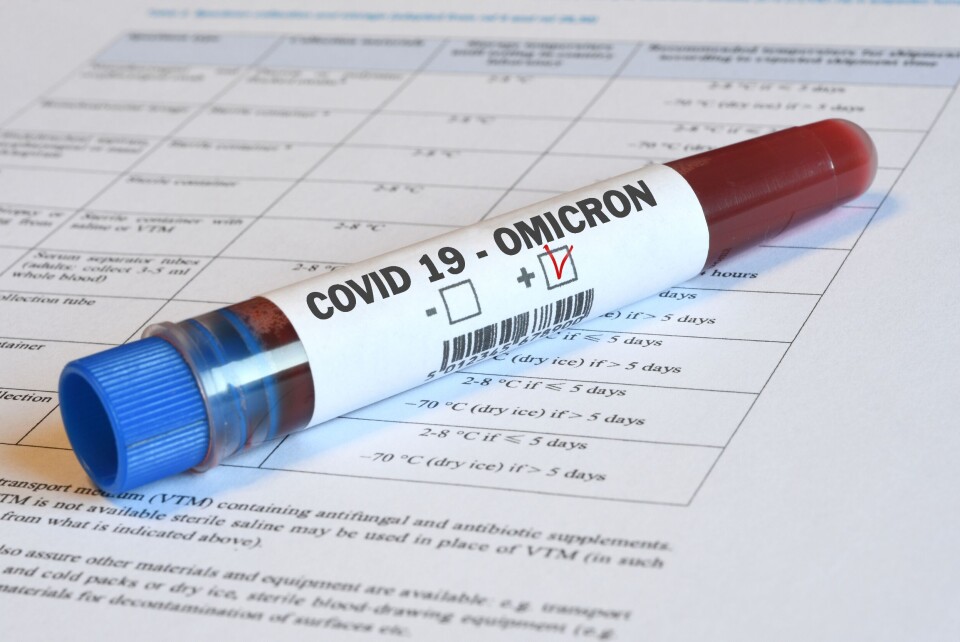-
Many Société Générale customers to be charged additional fees from April
There is some good news for international banking and instant transfers, however
-
Why gas prices in France are rising in April - and by how much
It comes after six consecutive monthly rises. Try these tips to reduce your bills
-
New notaire data suggests easing of Paris property crisis
Property experts have talked of ‘easing pressure’ and ‘breathing space’ after a four-year slump
Covid hospital stays in France are shorter with Omicron than Delta
This is what French health minister told the senate saying the Omicron variant causes ‘relatively strong flu-like symptoms’

The Covid Omicron variant causes fewer issues than its predecessors, the French health minister has said, with shorter stays in hospital and fewer admissions to intensive care.
Olivier Véran made the statement yesterday (January 10) as Omicron continues to dominate in France.
He said that the variant is more contagious and causes “relatively strong flu-like symptoms”.
This comes as the Organisation mondiale de la santé (OMS, or WHO in English) director Hans Kluge explained that if cases continue to rise in the same manner, half of Europe will [or will have been] infected with the Omicron variant within two months.
Mr Kluge based that explanation on a report from the Institute for Health Metrics and Evaluation.
But although Omicron causes a “consequent rise in hospitalisations”, Mr Véran said, “we now have enough perspective to see that [hospital stays] are shorter than with previous variants”, and that it “causes less respiratory distress so sends fewer patients to intensive care”.
The variant appears to affect higher parts of the respiratory system rather than the lungs, in contrast to previous variants, and so hospitalised patients “have a need for oxygen for three or four days, and can then leave”.
Delta menace nos réanimations par ses formes graves.
— Olivier Véran (@olivierveran) January 3, 2022
Omicron menace nos lits de médecine par ses formes symptomatiques nombreuses.
Dans les deux cas, le vaccin avec rappel protège. Le télétravail, la limitation des grands rassemblements et le pass vaccinal freinent. pic.twitter.com/OGpYe1AgLI
Delta versus Omicron
Mr Véran’s comments are supported by a study by l’Assistance publique-hôpitaux de Paris (AP-HP), the results of which were published last night.
The study of 3,100 patients – of which 500 were taken into critical care units and 2,600 were admitted to a normal ward between December 1 and January 4 – show that the probability of requiring critical care intervention is “three times higher for patients infected with Delta than Omicron”.
Stays in hospital with Omicron are also shorter. 43% of patients admitted to hospital with Omicron were hospitalised for one day or less, compared to just 19% of those with the Delta variant.
The length of hospital stays is a crucial metric to measure the pressure and saturation of the healthcare system during the crisis.
In France, Omicron appears to be gaining in dominance and showing no signs of abating yet, having caused an explosion in cases since its arrival in late 2021. Mr Véran has stopped short of predicting when the peak of the spread might take place.
Yet, the minister said he was encouraged by the news coming out of the UK, where Omicron spread earlier than in France.
He said: “In the London region, where it hit first, it is now dropping.” Similarly, the peak of the infections now appears to have been and gone in South Africa, where the new variant was first reported.
And despite the variant’s rapid spread and high contagion, it also appears to be less dangerous overall.
Mr Véran said that the Delta variant, once dominant in France, “seems to be dropping slowly, perhaps because of competition with the Omicron variant, which is more contagious, and certainly because of the measures that we have put in place, especially working from home”.
“I am staying cautious, but this may be reassuring news for our intensive care services in 10-15 days,” he said.
He added that the majority of people hospitalised with Delta were either immunosuppressed or had not been vaccinated.
The latest figures (January 10) show that there were 93,896 new cases recorded in the past 24 hours, and 280 new deaths (although the figures for Mondays are generally lower than average, as many testing facilities are shut over the weekend).
Delta report: Dropping but not disappearing
Mr Véran’s statement on the Delta variant comes following an update on the situation in the most recent pandemic report from health body Santé publique France.
The study showed that although Omicron is now dominant (making up 74% of confirmed cases), cases of Delta are hovering at a stable rate.
It found that even though the proportion of Delta infections fell rapidly over the past month (from 98% of cases on December 6 to 25% today), the variant is not disappearing completely.
Read more:Covid France: Delta variant is not disappearing despite Omicron surge
In fact, Delta only appears to be dropping when contrasted with the very high number of Omicron cases, but the absolute number appears similar.
On January 3, an estimated 42,000 Delta cases were detected in France according to extrapolated sequencing data. This figure is only slightly lower than the Delta-related case peak of 47,000, recorded on December 13, suggesting that it is continuing to infect a similar number of people.
Professor Mircea Sofonea, epidemiology and infectious diseases expert at the University of Montpellier, explained: “Omicron is already the dominant variant, and will become even more widespread, in the same way as in South Africa and the UK, but that doesn’t mean that Delta will disappear straight away.”
Related articles
Coronavirus: Daily updates on the situation in France
Covid France: Delta variant is not disappearing despite Omicron surge
Covid test rate at ‘unprecedented’ high, French Health Ministry states
























